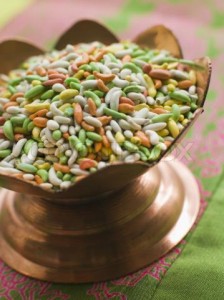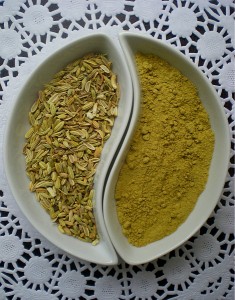
Often placed near the exit of an Indian restaurant is a tray of small colored candy. These are coated fennel seeds. They have a sweet, almost licorice like taste. Chewing fennel seeds after a meal is a common practice in India. They aid in digestion and also freshen the breath. Known in Hindi as saunf, fennel is often used in Indian recipes. Fennel is a member of the parsley family and its scientific name is Foeniculum vulgare.
HISTORICAL USES OF FENNEL
Historically, fennel has been utilized for treating indigestion, constipation, respiratory issues, eye problems, colic, menstrual disorders, anemia, diarrhea and flatulence. Fennel contains a variety of anti-oxidants, vitamins, minerals, and dietary fiber. Fennel seeds are a good source of vitamins B-3 & C, potassium, magnesium, manganese, and iron. 100 grams of fennel seeds provide almost 40 grams of dietary fiber. A majority of this fiber is metabolically inert insoluble fiber, which helps the increase bulk of food by absorbing water throughout the digestive system and alleviating any constipation. The fibers which are found in fennel seeds remove toxins as well as cancerous substances from the intestines. Dietary fibers bind to bile salts (which are produced from cholesterol) and this decreases their re-absorption in the colon, thus leading to lower LDL (the “lousy”) cholesterol levels. Along with flavonoid anti-oxidants, the fiber from fennel protects the colon mucus membrane from cancer.
Fennel seeds contain phytoestrogens and phytonutrients such as flavonoids, carotenoids, camphene, and anethole. The phytonutrients found in fennel include the flavonoids rutin, quercitin, and various kaempferol glycosides – which provide powerful antioxidant actions. The anethole in fennel has been shown in studies to reduce inflammation and to prevent the occurrence of cancer.
AYURVEDIC PROPERTIES
According to Ayurveda, fennel may be used to decrease all three doshas: Vata, Pitta, and Kapha. It has a sweet, slightly astringent, and bitter taste, or rasa. It is cooling and its after-taste or vipak is sweet. Ayurveda advises against cooking fennel, as its active ingredients will die. It is better to steep fennel. Fennel is used as a digestive tonic, a mild laxative, and a diuretic. It helps remove toxins from the body.
HOME REMEDIES
The unique health benefits of fennel may be used in number of Ayurvedic home remedies:
- For colds, take ½ tsp of fennel powder with a pinch of sugar as a tea.
- To reduce a fever, take 1 cup grape juice with ½ tsp fennel powder and ½ tsp cumin powder.
- For gas, make a mixture of equal parts of roasted fennel, cumin, and celery seeds. Chew ½ – 1 tsp of this mixture after meals and then swallow with a cup of warm water.
- To purify your blood, consume a handful of raw fennel seeds in the morning and evening.
- If a breast-feeding baby has no appetite, make fennel tea. Steep 1 tsp of fennel seeds in a cup of water that has been heated over the stove. Cool and feed the baby 1 tsp of this tea every 10 to 15 minutes.
- For nursing moms who need to increase lactation, boil ½ liter of water and add 2 tsp of fennel seeds. Allow to cool, then strain, and add ½ tsp of raw honey to taste. Drinking 2 – 3 cups daily is ok for nursing moms.
- In cases of heat stroke, soak a handful of fennel seeds in water overnight. Strain the water and add a pinch of mineral salt before drinking.
- To promote bowel movements, chew 1 tsp of roasted fennel seeds after meals.
SOME PRECAUTIONS
It is recommended that pregnant women stay away from mixtures containing great amounts of fennel. In large quantities, it acts as a uterine stimulant. However, it may be used in meals. Nursing moms should not use fennel essential oil. If using the volatile oil, avoid direct contact with the skin, as it can cause dermatitis for people who have sensitive skin. While having multiple beneficial uses, certain components of essential oils such as anethol, and a few chemicals present in fennel, can be problematic if ingested in large doses. These compounds which kill bacteria and microbes in low doses but they can be harmful if ingested in larger doses. Please consult your physician or primary health care practitioner on the best way to incorporate herbal remedies into your life.

As a diuretic, and a urinary alkaline, fennel helps remove toxic substances from the body and assists in reducing rheumatism and swelling. Certain constituents of the essential oils in fennel are stimulants and they promote the secretion of digestive and gastric juices, reduce inflammation of the stomach and intestines, and aid in the proper absorption of nutrients from food. This spice has anti-acidic and anti-spasmodic properties as well; it relieves intestinal spasms or cramps.
Due to its fragrant smell, fennel is commonly used worldwide in toothpastes, breath fresheners, antacids, desserts, and in a variety of culinary creations. This includes fennel pollen. Pick up some fennel seeds or powder or a fennel bulb, spice up your life, and get cooking!
